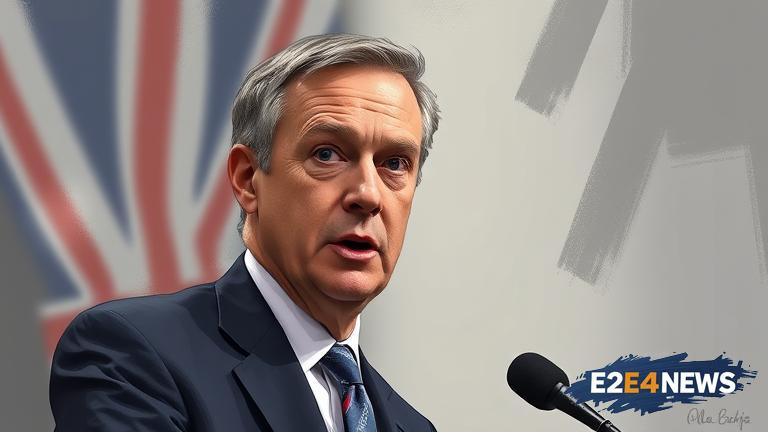Nigel Farage, a prominent UK politician, has unveiled a plan to repeal certain rights laws and deport asylum seekers, a move that has sparked widespread controversy and debate. The plan, which has been met with criticism from human rights groups and opposition parties, aims to reduce the number of asylum seekers in the UK and streamline the deportation process. Farage has argued that the current system is too lenient and allows too many people to stay in the country who do not genuinely need protection. He has also claimed that the plan will help to reduce the financial burden on the UK’s welfare system and free up resources for other priorities. However, critics have argued that the plan is inhumane and will lead to the deportation of people who are genuinely in need of protection. They have also pointed out that the plan is likely to be in breach of international human rights law. The plan has been met with opposition from human rights groups, who have argued that it will undermine the UK’s commitment to protecting the rights of asylum seekers. The UK’s opposition parties have also criticized the plan, with some accusing Farage of trying to whip up anti-immigrant sentiment for political gain. Despite the controversy, Farage has remained defiant, arguing that his plan is necessary to restore public trust in the UK’s immigration system. The plan has sparked a wider debate about the UK’s immigration policy and the treatment of asylum seekers. Many have argued that the UK has a moral obligation to provide protection to those who are fleeing persecution and violence. Others have argued that the UK’s immigration system is too generous and needs to be reformed to prioritize the needs of British citizens. The debate has highlighted the deep divisions within the UK about immigration and the treatment of asylum seekers. The plan has also sparked concerns about the potential impact on the UK’s relationships with other European countries. Some have argued that the plan will damage the UK’s reputation as a champion of human rights and will lead to a decline in cooperation with other countries on immigration issues. The UK government has yet to respond to Farage’s plan, but it is likely to face significant opposition from human rights groups and opposition parties. The plan has also sparked a wider debate about the role of politics in shaping the UK’s immigration policy. Many have argued that politicians are using immigration as a wedge issue to divide public opinion and win votes. Others have argued that the UK’s immigration policy should be based on evidence and a commitment to protecting human rights, rather than political expediency. The controversy surrounding Farage’s plan has highlighted the need for a more nuanced and informed debate about the UK’s immigration policy. It has also sparked concerns about the potential impact on the UK’s social cohesion and community relations. The plan has been met with criticism from business leaders, who have argued that it will damage the UK’s economy and lead to a shortage of skilled workers. The plan has also sparked concerns about the potential impact on the UK’s public services, including the NHS and education system. The debate has highlighted the need for a more comprehensive and sustainable approach to immigration, one that balances the needs of the UK’s economy and public services with the need to protect human rights and provide protection to those who are genuinely in need. The plan has sparked a wider debate about the UK’s place in the world and its commitment to upholding human rights. Many have argued that the UK has a moral obligation to provide leadership on human rights issues and to promote a more humane and sustainable approach to immigration. The controversy surrounding Farage’s plan has highlighted the need for a more informed and nuanced debate about the UK’s immigration policy and its impact on the country’s social cohesion, economy, and international relationships.
